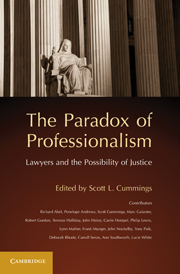Book contents
- Frontmatter
- Contents
- List of Tables and Figures
- Contributors
- Preface and Acknowledgments
- 1 Introduction
- PART I LAWYERS AND THE PUBLIC GOOD: THE FUNDAMENTAL DILEMMA
- PART II LAWYERS AND THEIR CLIENTS: DETERMINANTS OF ETHICAL PRACTICE
- PART III LAWYERS AND SOCIAL CHANGE: MOBILIZING LAW FOR JUSTICE
- 10 Without Fear, Favor, or Prejudice
- 11 Lawyers in National Policymaking
- 12 Cause Lawyers and Other Signs of Progress
- 13 African Youth Mobilize against Garbage
- 14 Epilogue
- Index
- References
11 - Lawyers in National Policymaking
Published online by Cambridge University Press: 05 June 2012
- Frontmatter
- Contents
- List of Tables and Figures
- Contributors
- Preface and Acknowledgments
- 1 Introduction
- PART I LAWYERS AND THE PUBLIC GOOD: THE FUNDAMENTAL DILEMMA
- PART II LAWYERS AND THEIR CLIENTS: DETERMINANTS OF ETHICAL PRACTICE
- PART III LAWYERS AND SOCIAL CHANGE: MOBILIZING LAW FOR JUSTICE
- 10 Without Fear, Favor, or Prejudice
- 11 Lawyers in National Policymaking
- 12 Cause Lawyers and Other Signs of Progress
- 13 African Youth Mobilize against Garbage
- 14 Epilogue
- Index
- References
Summary
INTRODUCTION
The political influence of lawyers is a frequent topic of journalism, and Tocqueville is often quoted, but systematic research on lawyers' political roles is sparse. There have, however, been some analyses of lawyers of specific types or within relatively narrow contexts. Studies have examined lawyers active as Washington lobbyists in four policy domains, members of the U.S. Supreme Court bar, and lawyers working for conservative and libertarian organizations in the mid-1990s. The last of those pieces of research found that the networks of relationships among the lawyers and the organizations that they served were divided into segments defined by particular constituencies and that there were substantial differences in the characteristics of lawyers serving differing constituencies. Some lawyers, however, bridged the segments, serving as mediators or brokers. Organizations such as the Federalist Society and the Heritage Foundation sought to build ties within the conservative coalition, but deep cultural differences separated lawyers for social conservatives from those representing other constituencies, making cooperation difficult.
In his afterword to a recent edition of The Power Elite, Alan Wolf observed:
In his emphasis on politics and economics, Mills underestimated the important role that powerful symbolic and moral crusades have had in American life, including McCarthy's witch-hunt after communist influence. Had he paid more attention to McCarthyism, Mills would have been more likely to predict such events as the 1998–99 effort by Republicans to impeach President Clinton, the role played by divisive issues such as abortion, immigration, and affirmative action in American politics, and the continued importance of negative campaigning.
- Type
- Chapter
- Information
- The Paradox of ProfessionalismLawyers and the Possibility of Justice, pp. 220 - 242Publisher: Cambridge University PressPrint publication year: 2011

